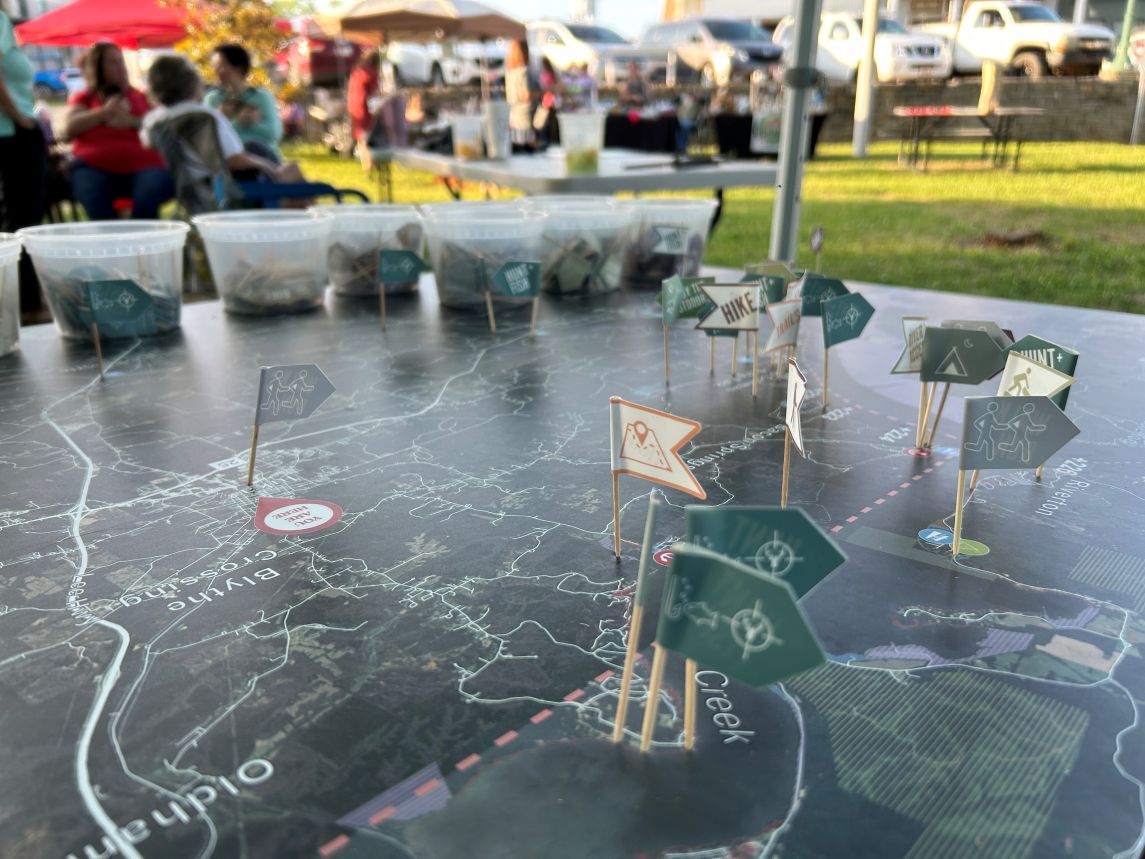
A Total Investment of $1 Million Will Strengthen the Rivertowns Program, Support Tourism Planning and Expand Access To Outdoor Recreation
KNOXVILLE, Tenn. — The Tennessee RiverLine has received a $500,000 planning grant from the Appalachian Regional Commission to strengthen its regional impact and advance its mission of outdoor recreation, economic development and community vitality along the 652-mile Tennessee River.
The $1 million investment includes a $500,000 grant from the Appalachian Regional Commission (ARC), matched by $500,000 in local funds, to the RiverTowns Program, which embraces the original concept of restorative recreation. Restorative recreation refers to the use of outdoor experiences such as paddling, walking or gathering along the river as a means to promote personal well-being, strengthen community identity and support long-term regional resilience. The grant-supported work will focus on 15 Appalachian communities in Tennessee, Alabama and Mississippi, and is funded through ARC’s Appalachian Regional Initiative for Stronger Economies (ARISE).
The Tennessee RiverLine reimagines the Tennessee River and adjacent public lands as a 1.2-million-acre river park that connects people and communities to each other and to the river landscape. The ARISE grant funding advances key priorities outlined in the Tennessee RiverLine’s 2025–2027 strategic plan, including expanding the reach and optimizing the impact of the RiverTowns Program, developing scalable recreation infrastructure and positioning the Tennessee River as a resource for long-term economic vitality and community well-being.
“Restorative recreation is more than a concept — it’s a commitment to engage outdoor recreation and investment in the infrastructures that make outdoor experiences possible as an intentional strategy to restore connections to place, economic resilience, environmental health and community well-being,” said Brad Collett, executive director of the Tennessee RiverLine. “This investment helps us accelerate our vision, expand partnerships and prepare to deliver measurable impact for the region and beyond.”
The planning project will pursue four key objectives:
- Optimize the RiverTowns Program to increase its reach, impact and operations.
- Develop plans for eco- and heritage-tourism infrastructure, including regional interpretation and storytelling.
- Prepare priority restorative recreation projects for implementation.
- Convene stakeholders to share lessons learned across the region.
This is made possible by a multi-state alliance of partners, including local leaders, tourism organizations, economic development agencies and nonprofit collaborators who share in the RiverLine’s vision. Collaborators from the University of Tennessee Institute of Agriculture, UT Knoxville, University of North Alabama, Auburn University, Trust for Public Land, Tennessee Valley Authority and Tishomingo County (MS) Tourism Council will help shape community-driven priorities, inform regional strategies and ensure that the initiative reflects the unique assets and aspirations of each participating place.
A 2022 economic impact study estimated that increased outdoor recreation activity along the Tennessee RiverLine could generate $104 million in direct and indirect spending, support nearly 2,000 jobs and add $65.5 million in personal income across the region. New economic analysis will be conducted as part of the grant to update and expand those projections. This analysis and other project outcomes will be used to pursue implementation funding from ARC and other partners.
“This investment will directly support mission-driven efforts to inspire stewardship, expand access to river experiences and catalyze local investment,” Collett said. “We’re proud to partner with ARC and project collaborators to continue building a model for asset-based regional vitality that communities across Appalachia and beyond can learn from.”
The Tennessee RiverLine is an initiative of UT Extension, with principal partners UT Knoxville and Tennessee Valley Authority, and is a continuous system of outdoor recreation experiences along the Tennessee River’s 652-mile reach. The University of Tennessee Institute of Agriculture is comprised of the Herbert College of Agriculture, UT College of Veterinary Medicine, UT AgResearch and UT Extension. Through its land-grant mission of research, teaching and extension, the University of Tennessee Institute of Agriculture touches lives and provides Real. Life. Solutions. to Tennesseans and beyond.